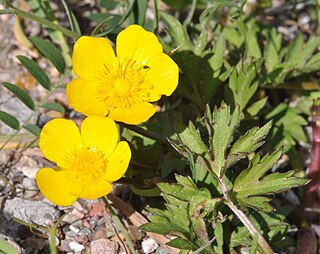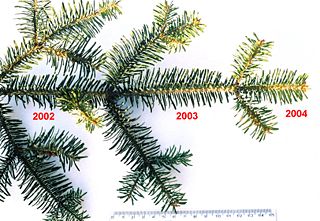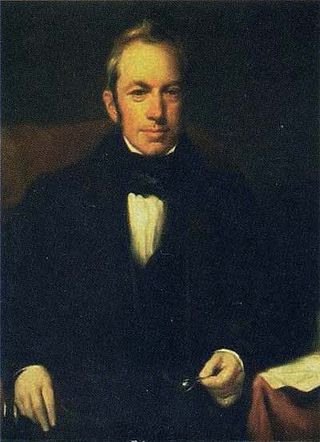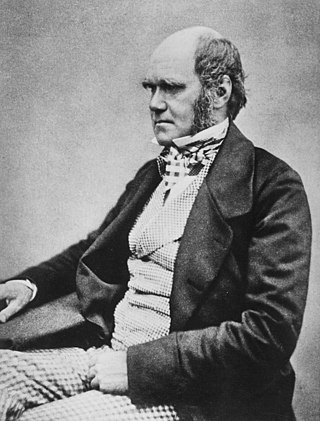
Flowering plants are plants that bear flowers and fruits, and form the clade Angiospermae, commonly called angiosperms. They include all forbs, grasses and grass-like plants, a vast majority of broad-leaved trees, shrubs and vines, and most aquatic plants. The term "angiosperm" is derived from the Greek words ἀγγεῖον / angeion and σπέρμα / sperma ('seed'), meaning that the seeds are enclosed within a fruit. They are by far the most diverse group of land plants with 64 orders, 416 families, approximately 13,000 known genera and 300,000 known species. Angiosperms were formerly called Magnoliophyta.

Monocotyledons, commonly referred to as monocots, are grass and grass-like flowering plants (angiosperms), the seeds of which typically contain only one embryonic leaf, or cotyledon. They constitute one of the major groups into which the flowering plants have traditionally been divided; the rest of the flowering plants have two cotyledons and were classified as dicotyledons, or dicots.

In botany, an evergreen is a plant which has foliage that remains green and functional throughout the year. This contrasts with deciduous plants, which lose their foliage completely during the winter or dry season.

Robert Anthony Plant is an English singer and songwriter. He was the lead singer and lyricist of the rock band Led Zeppelin from its founding in 1968 until their breakup in 1980; since then he has had a successful solo career, sometimes collaborating with other artists such as Alison Krauss. Regarded by many as one of the greatest singers in rock music, he is known for his flamboyant persona and raw stage performances.

Legumes are plants in the family Fabaceae, or the fruit or seeds of such plants. When used as a dry grain for human consumption, the seeds are also called pulses. Legumes are grown agriculturally, primarily for human consumption; for livestock forage and silage; and as soil-enhancing green manure. Well-known legumes include beans, chickpeas, peanuts, lentils, lupins, mesquite, carob, tamarind, alfalfa, and clover. Legumes produce a botanically unique type of fruit – a simple dry fruit that develops from a simple carpel and usually dehisces on two sides.

Robert Brown was a Scottish botanist and paleobotanist who made important contributions to botany largely through his pioneering use of the microscope. His contributions include one of the earliest detailed descriptions of the cell nucleus and cytoplasmic streaming; the observation of Brownian motion; early work on plant pollination and fertilisation, including being the first to recognise the fundamental difference between gymnosperms and angiosperms; and some of the earliest studies in palynology. He also made numerous contributions to plant taxonomy, notably erecting a number of plant families that are still accepted today; and numerous Australian plant genera and species, the fruit of his exploration of that continent with Matthew Flinders.
In biology, a monotypic taxon is a taxonomic group (taxon) that contains only one immediately subordinate taxon. A monotypic species is one that does not include subspecies or smaller, infraspecific taxa. In the case of genera, the term "unispecific" or "monospecific" is sometimes preferred. In botanical nomenclature, a monotypic genus is a genus in the special case where a genus and a single species are simultaneously described. In contrast, an oligotypic taxon contains more than one but only a very few subordinate taxa.

Viticulture, viniculture, or winegrowing is the cultivation and harvesting of grapes. It is a branch of the science of horticulture. While the native territory of Vitis vinifera, the common grape vine, ranges from Western Europe to the Persian shores of the Caspian Sea, the vine has demonstrated high levels of adaptability to new environments, hence viticulture can be found on every continent except Antarctica.

The International Union for the Protection of New Varieties of Plants or UPOV is a treaty body with headquarters in Geneva, Switzerland. Its objective is to provide an effective system for plant variety protection. It does so by defining a blueprint regulation to be implemented by its members in national law. The expression UPOV Convention also refers to one of the three instruments that relate to the union, namely the 1991 Act of the UPOV Convention, 1978 Act of the UPOV Convention and 1961 Act of the UPOV Convention with Amendments of 1972.

Plant breeders' rights (PBR), also known as plant variety rights (PVR), are rights granted in certain places to the breeder of a new variety of plant that give the breeder exclusive control over the propagating material and harvested material of a new variety for a number of years.

The Chernobyl Nuclear Power Plant (ChNPP) is a nuclear power plant undergoing decommissioning. ChNPP is located near the abandoned city of Pripyat in northern Ukraine, 16.5 kilometers (10 mi) northwest of the city of Chernobyl, 16 kilometers (10 mi) from the Belarus–Ukraine border, and about 100 kilometers (62 mi) north of Kyiv. The plant was cooled by an engineered pond, fed by the Pripyat River about 5 kilometers (3 mi) northwest from its juncture with the Dnieper river.

Dirachma is the sole genus of the family Dirachmaceae. The genus had been monotypic, its sole species being the woody plant Dirachma socotrana, until a second, herbaceous, species, Dirachma somalensis, was discovered in Somalia and described in 1991.

The eudicots, Eudicotidae, or eudicotyledons are a clade of flowering plants (angiosperms) which are mainly characterized by having two seed leaves (cotyledons) upon germination. The term derives from dicotyledon. Previously, they were called tricolpates or non-magnoliid dicots by past authors. The current botanical terms were introduced in 1991, by evolutionary botanist James A. Doyle and paleobotanist Carol L. Hotton, to emphasize the later evolutionary divergence of tricolpate dicots from earlier, less specialized, dicots.

The Botanical Society of Britain and Ireland (BSBI) is a scientific society for the study of flora, plant distribution and taxonomy relating to Great Britain, Ireland, the Channel Islands and the Isle of Man. The society was founded as the Botanical Society of London in 1836, and became the Botanical Society of the British Isles, eventually changing to its current name in 2013. It includes both professional and amateur members and is the largest organisation devoted to botany in the British Isles. Its history is recounted in David Allen's book The Botanists.

The Cabombaceae are a family of aquatic, herbaceous flowering plants. A common name for its species is water shield. The family is recognised as distinct in the Angiosperm Phylogeny Group IV system (2016). The family consists of two genera of aquatic plants, Brasenia and Cabomba, totalling six species.
Germplasm Resources Information Network or GRIN is an online USDA National Genetic Resources Program software project to comprehensively manage the computer database for the holdings of all plant germplasm collected by the National Plant Germplasm System.

Charles Robert Darwin was an English naturalist, geologist, and biologist, widely known for his contributions to evolutionary biology. His proposition that all species of life have descended from a common ancestor is now generally accepted and considered a fundamental scientific concept. In a joint publication with Alfred Russel Wallace, he introduced his scientific theory that this branching pattern of evolution resulted from a process he called natural selection, in which the struggle for existence has a similar effect to the artificial selection involved in selective breeding. Darwin has been described as one of the most influential figures in human history and was honoured by burial in Westminster Abbey.
The Australian Plant Name Index (APNI) is an online database of all published names of Australian vascular plants. It covers all names, whether current names, synonyms or invalid names. It includes bibliographic and typification details, information from the Australian Plant Census including distribution by state, links to other resources such as specimen collection maps and plant photographs, and the facility for notes and comments on other aspects.
Schizopodidae is a family of beetles, in the large suborder Polyphaga. It was a subfamily until 1991, when it was elevated to family status.

Yevpatoria Airport "Yevpatoria aircraft repair plant" is an airport in Yevpatoria, Crimea. The airport is located just east of the city.















